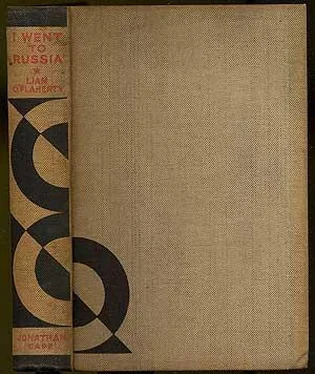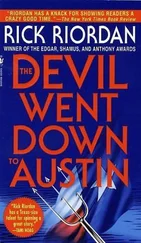‘Good God!’ I thought. If he only knew my real purpose!’
In the same way,’ he continued, ‘all foreign books translated into Russian pass through our hands and such books are translated as we consider useful to the proletarian revolution and only such. We also publish in our magazine such stories and articles by foreign writers as are useful for our proletariat. The situation is such. There is also, of course, in Russia, the Bureau of Proletarian Writers, which is under the direction of this Bureau, because all writers must be organised and literature must play a revolutionary role in building up the Soviet Union and also help greatly with the Five Year Plan. Later you shall see all that. Now we shall go at first to a cinema with all the comrades and then arrange about your room and other things.’
However, I had to remain in the room while a long argument went on about something which I could not understand. This lasted an hour and there seemed to be no reason why it should not last for ever. Everybody talked at once and there seemed to be nobody in charge, although there was a secretary and treasurer and various other officials present. This intrigued me, especially as every once in a while somebody approached and jocularly told me in bad French what an anarchist I was and that I would do well to study a little proletarian discipline. What damned humbug!
The noise got on my nerves to such an extent that I felt utterly dazed when they all finally dashed out of the Bureau into the street, on the way to the Sovkino studio, where the film was to be shown. On the way we met a troupe of German actors and actresses who were also going to the film. It was, in fact, shown for their benefit. They were playing in Moscow just then. We all went together.
Moving in the same anarchical fashion, with a great deal of shouting and laughter, we arrived finally at the showroom (I could not for the life of me say where it was or how we got there, for even though I enquired several times as to names of streets and other things, the last thing one can get in Russia is a plain answer to a plain question). Still shouting and laughing, we all sat down and the film was thrown on the screen. The shouting and the laughter continued.
I love this new art of the cinematograph. No other art can give such a respite from reality, which is sometimes a torture, being the consciousness of poverty, sorrow or pain. In the gloom of the cinema theatre one can dream in peace, in silence, although one is surrounded by people, while the farthest ends of the earth are brought to one’s immediate vision. In the theatre where living actors are on the stage, the dream illusion is not sufficiently strong, as the flesh and blood of the actors thrust themselves into the foreground. But on the screen all is an illusion, everything is remote and completely detached from one’s immediate environment. One is spying on an imitation of life, concealed and unknown.
For that reason, I hate films that are educational or dogmatic and I hate being spoken to when in a film theatre. The dream illusion is destroyed. For that reason also, I cannot understand the craze of our intellectuals for the modern Russian film. All of them that I have seen amuse me less than the wild films of cowboy life which used to be such a popular export from the Hollywood studios; certainly much less interesting than the early comic films of Chaplin and the serious products of the German studios.
All modern Russian films that I have seen are based on a theory of some sort. Art, on the other hand, is not based on a theory, nor on any preconceived dogma; but it springs out of life and is brought to life by a vision in the mind of the artist, which, in itself, comes into the mind from a wild fever in the bowels and is inexplicable. To me this Russian deification of the mass as the sole material for artistic creation is atavistic drivel, the child of mediocrity, which, in its jealousy of genius, throws itself on the bosom of the mob. Neither is it anything new, but an intense form of the decadent theories current in western European capitals in the years immediately preceding the War. In art, ambitious theories are always a sign of impotence and laziness and mediocrity.
Here a film was thrown on the screen dealing with the naval revolt at Kronstadt during the revolution of 1917. Its sole importance was that it dealt with the revolution of 1917, which is an historical event of great importance. Even so, I was prepared to enjoy it, but my friend Levit insisted on translating the sub-titles in a loud voice, right into my ear. At the same time two other guides were translating the sub-titles into German for the benefit of the Germans, while still another guide was translating the sub-titles into Japanese for the benefit of a Japanese visitor. The others, at the same time, were carrying on conversations, passing loud remarks on the film and laughing. The guides tried to shout one another down and sometimes argued about the translations. I tried to stop my guide, saying I was not interested in the sub-titles. But he refused to stop, being obviously solely interested in shouting down his rivals and showing off his knowledge of English. Finally, in order to escape, I whispered in his ear that I wanted to go to the lavatory.
‘But certainly,’ said comrade Levit, ‘we shall go-’
Straightaway, we fetched my kit from the Grand Hotel and brought it to The House of the East, where a room had already been found for me. I was given a magnificent room, larger than most flats in London and Paris. In fact, it was a suite of rooms all in one, for there were two large alcoves, curtained off, one containing two small beds and the other being a dressing room. The main room was furnished as a sitting room. I appreciated the civilised motives which inspired the two beds; as if the management understood that I might very easily get married at any moment during the day or night.
It was seven o’clock by the time we had finished arrangements about my room and as I had eaten nothing since breakfast, I suggested a meal.
‘Wonderful,’ said my friend. ‘We shall eat at the House of the Press.’
He had no objection to Isvostiks, so I was at last able to satisfy my craving for a ride in one. I found it very pleasant. One is almost on a level with the street, not enclosed in any way, able to observe the pedestrians and the scenery in comfort, owing to the extremely slow motion of the horse, and yet persuaded that the journey is being made at the greatest possible speed by the furious oaths and whippings of the driver. On the way my friend told me a great deal about himself.
‘You see,’ he said, pointing at Moscow with a circular wave of his arms, ‘this city is not suitable for the building of socialism. It is, like many European writers, a mass of nonsense, all twists and turns and very much irregularity. All this very probably must be torn down and a new city built in its place. All the streets must be torn up, the cobble stones taken away and the holes filled up and the surface covered with asphalt. The districts must be organised on a rational basis. Communal housing systems must be made, department stores built, everything on a mass scale as is necessary for socialism, and the ideas of proletarian culture and hygiene, put into practice by the introduction of so-tospeak rus in urbe and local facilities for the satisfaction of the mass craving for art and such things of the intellect. So you see, the situation is such, immense work is to be done, not only here but in all the Union. And we all look upon ourselves as soldiers in this great, and I may say holy, war, to build a beautiful life, which is socialism. It is an immense work. Sometimes I shudder and sweat when I think of this immense work.’
Here he shuddered and put his hand on his heart.
Читать дальше












